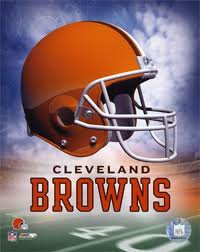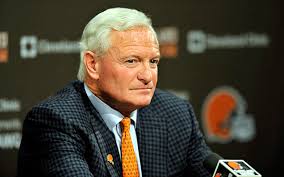As I sit down to write this post, every professional football team is in the middle of what they call OTA’s or Organized Team Activities. This is where, very early on in the training cycle, rookies, free agents and established team members come together to begin the process of building a team. It makes no difference  whether it’s the Cleveland Browns or the San Diego Chargers, each team must find its identity and find its own way…but what about ETHICS TRAINING?
whether it’s the Cleveland Browns or the San Diego Chargers, each team must find its identity and find its own way…but what about ETHICS TRAINING?
I must admit, that coming from the Southeast, that football is in our blood down here and we love just about anything football related. Honestly though, you don’t have to be a football fan to understand the process of a team coming together. Your company is a team; your charitable organization; your House of Worship or even your neighborhood association is a team.
However, professional football takes team building and team support to a whole new level. There are coaches, of course, and sports physicians, exercise physiologists, nutritionists, trainers, psychologists, team security, league security, investment advisors, equipment managers, and the list goes on and on.
But what about ethics? Who teaches the coaches and the players about ethical behavior? Should there also be OTE’s (optional training in ethics)? Should it be optional?
The Behavior of Football
The stakes in professional football are enormous. It is much more than what transpires on the field. Each professional football team counts its assets in the millions and billions of dollars. The ripple effect of unethical behavior of any team is now felt in far-flung places. Football is global, and we must thank the Internet, media, and social media; also, let’s not forget travel. We are a very mobile society, physically as well as hand-held devices.
I mentioned the Cleveland Browns above; a pretty small market team. I’m positive that somewhere in London, England, Tokyo, Japan and even in Buenos Aires there are displaced Browns fans who follow the team and who care about the decisions of the players on the team. They may listen to Browns’ games streaming on-line, have team jerseys and for all I know, a favorite sports bar.
By extension, each player takes on a life larger than himself, as do coaches, coordinators, managers and team owners.
A football hero may be loved by everyone who loves the team; but a football blunder, especially an ethical blunder reverberates throughout the sports world – and beyond.
Enter Flying J
Owning a sports team is hardly small potatoes. It is the domain of the very rich and the very powerful. Mr. Jimmy Haslam owns the Cleveland Browns and he  also owns Pilot Flying J. Pilot Flying J, is a privately held company. You may not have heard of them, but if you are a trucker, you would know them quite well. They are the nation’s largest retailer of diesel fuel. They own stations and rest stops across the country and sales are about $29 billion a year.
also owns Pilot Flying J. Pilot Flying J, is a privately held company. You may not have heard of them, but if you are a trucker, you would know them quite well. They are the nation’s largest retailer of diesel fuel. They own stations and rest stops across the country and sales are about $29 billion a year.
Pilot Flying J has recently been accused of rebate fraud. They are being investigated for “deceptively withhold(ing) diesel fuel price rebates” from truckers who are entitled to receive them. You would think that the price of diesel fuel and rebate fraud have little or nothing to do with professional football. But the investigation has prompted some people in sports to call for Mr. Haslam’s head.
In an online ESPN article entitled: “Browns owner’s company in trouble,” dated April 19, 2013, it was stated:
“NFL spokesman Greg Aiello told the Cleveland Plain Dealer the league has no plans of asking Haslam to step away from the franchise during the investigation.”
Indeed, the management of the Browns football operations has been adamant that Mr. Haslam is a model owner and they enjoy working for him. For Mr. Haslam’s part, the article states:
“Haslam denied wrongdoing in a news conference earlier this week. He said in a statement Thursday that ‘the foundation of this company is built on its integrity and that any willful wrongdoing by any employee of this company at any time is intolerable.’
He said the company would continue to cooperate with authorities and conduct its own investigation.”
I have no reason to doubt his words; in fact, I applaud them. But it leads me to an idea as the 2013 football season is still in its infancy.
I wonder if the Cleveland Browns would say, “You know, we’re so committed to integrity, that I would really like is to have the entire organization go through ethics training.”
It is no secret that professional football has been rocked by scandal in virtually every year of its existence. 2013 will, unfortunately, probably be no different. There will be infractions, misdemeanors, felonies and while I hope not, there may be worse. I do know that every misstep at its core is really an ethical lapse. Whether driving drunk, doing something stupid in a night club, accepting questionable gifts – anything, can cause a decent person or even a decent organization to go from a winner to a loser.
I am always lecturing to people about actions and consequences. In professional sports it is even worse. If there is even a perception of wrong doing, such as in Mr. Haslam’s situation, it can taint an entire team from the top, down to the bottom. By extension, a player’s actions off the field, for example an association with unsavory characters who commit a crime, can taint an organization from the bottom, up to the top.
Can ethics training solve every problem? No. But can it cause a team member to think twice before acting? I have seen that positive outcome a thousand times over. I am always here to help.
YOUR COMMENTS ARE WELCOME!

